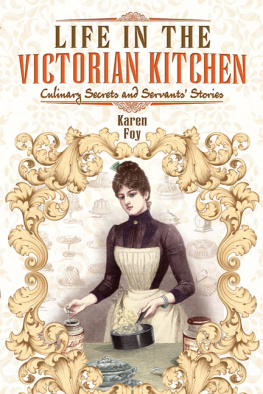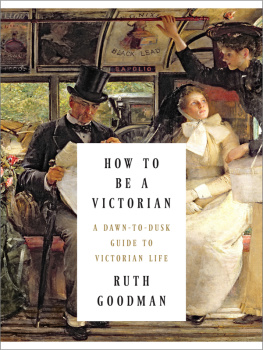Fiona MacDonald - Victorian Servants: A Very Peculiar History
Here you can read online Fiona MacDonald - Victorian Servants: A Very Peculiar History full text of the book (entire story) in english for free. Download pdf and epub, get meaning, cover and reviews about this ebook. year: 2010, publisher: Book House, genre: History. Description of the work, (preface) as well as reviews are available. Best literature library LitArk.com created for fans of good reading and offers a wide selection of genres:
Romance novel
Science fiction
Adventure
Detective
Science
History
Home and family
Prose
Art
Politics
Computer
Non-fiction
Religion
Business
Children
Humor
Choose a favorite category and find really read worthwhile books. Enjoy immersion in the world of imagination, feel the emotions of the characters or learn something new for yourself, make an fascinating discovery.

- Book:Victorian Servants: A Very Peculiar History
- Author:
- Publisher:Book House
- Genre:
- Year:2010
- Rating:5 / 5
- Favourites:Add to favourites
- Your mark:
- 100
- 1
- 2
- 3
- 4
- 5
Victorian Servants: A Very Peculiar History: summary, description and annotation
We offer to read an annotation, description, summary or preface (depends on what the author of the book "Victorian Servants: A Very Peculiar History" wrote himself). If you haven't found the necessary information about the book — write in the comments, we will try to find it.
Victorian Servants: A Very Peculiar History — read online for free the complete book (whole text) full work
Below is the text of the book, divided by pages. System saving the place of the last page read, allows you to conveniently read the book "Victorian Servants: A Very Peculiar History" online for free, without having to search again every time where you left off. Put a bookmark, and you can go to the page where you finished reading at any time.
Font size:
Interval:
Bookmark:
Title Page
VICTORIAN SERVANTS, A VERY PECULIAR HISTORY
With added elbow grease
Written by
Fiona Macdonald
Created and designed by David Salariya
Publisher Information
First published in Great Britain in MMXII by Book House, an imprint of
The Salariya Book Company Ltd
25 Marlborough Place, Brighton BN1 1UB
www.salariya.com
www.book-house.co.uk
Digital edition converted and distributed in 2012 by
Andrews UK Limited
www.andrewsuk.com
Editor: Jamie Pitman
Assistant editor: Jodie Leyman
The Salariya Book Company Ltd MMXII
All rights reserved. No part of this publication may be reproduced, stored in or introduced into a retrieval system or transmitted in any form, or by any means (electronic, mechanical, photocopying, recording or otherwise) without the written permission of the publisher. Any person who does any unauthorised act in relation to this publication may be liable to criminal prosecution and civil claims for damages.
Every effort has been made to trace copyright holders. The Salariya Book Company apologises for any omissions and would be pleased, in such cases, to add an acknowledgement in future editions.
Visit our website at
www.book-house.co.uk
or go to
www.salariya.com
for free electronic versions of:
You Wouldnt Want to be an Egyptian Mummy!
You Wouldnt Want to be a Roman Gladiator!
You Wouldnt Want to Join Shackletons Polar Expedition!
You Wouldnt Want to Sail on a 19th-Century Whaling Ship!
Dedication
To all servants today
FMacD
Quotes

No man is a hero to his servants.
French writer and thinker Michel de Montaigne (15331593)
Good masters and mistresses [are] quite as rare as good servants.
British actress Fanny Kemble (18091893)
A good mistress will make a good servant.
Popular Victorian saying
Ladies and gentleman are permitted to have friends in the kennel, (among pet dogs and horses) but not in the kitchen (among servants).
Irish dramatist George Bernard Shaw (18561950)
The lowest work I think is honourable in itself and the poor drudge (hard-working servant) is honourable too.
Maid-of-all-work Hannah Cullwick (18331909)

CHAPTER EIGHT: A good character
In 1879, The Times newspaper in London printed a letter from one of its readers. The writer made a suggestion that seems quite outrageous today. (To be fair, many Victorians did not like it, either.) He proposed that each servant should be issued by the police, no less with a blank book containing numbered pages. Starting on page 1, each new employer should write a character (reference) for the servant, adding extra remarks about their work, appearance, habits, morals and so on, as they thought fit.
Servants would be ordered not to remove any pages from the book, no matter what unkind, unjust or unflattering comments had been written about them. But if they did so, the numbers on the pages would show that some were missing. This would arouse suspicion in any employers mind, and make it very difficult for the servant, now labelled as a bad character, to get another job.
A real lady?
What had servants done to make people want to treat them with such distrust, as if they were criminals? Nothing in particular. The writer was just voicing, in an extreme way, the anxiety felt by the new servant-keeping middle class of Victorian Britain.
As early as the 1840s, people were making jokes about this:
[The best way to make an employer agree with the way you want to work is] by declaring that you never heard of any lady requiring whatever it may be that you have set your face against. By laying stress on the word lady, you show your knowledge of the habits of the superior classes; and as the person hiring you will probably wish to imitate their ways, she will perhaps take your hint as to what a lady ought to do.
Punch magazine, 1845
The writer is mocking sly, scheming servants, as well as snobbish middle-class employers.
Band of brothers and sisters
Later, by the 1870s, so many people wanted domestic help that servants began to make organised public demands for better treatment. These were supported by Victorian social reformers, and inspired by workers in factories and mines, who joined together in trades unions. The first servants unions were set up in 1872, in Dundee and Leamington. But the servants came from such downtrodden families, lived such isolated lives, and were so seldom free to attend meetings, that the unions did not survive. Servants had to wait until the 20th century before they won any real workers rights.

Strange but true no. 1
The Dundee maids protested because they were forced to wear a rather silly headdress as a sign of their servant status. Nicknamed the flag, it was tall and flapped above their heads as they worked. How irritating!

The maids also demanded but did not get half a day free from work each week, a whole day off on alternate Sundays, and payment every three months rather than half-yearly.
Into service
So, being a Victorian servant meant submitting yourself to a powerful employer for all your working life but, as we saw in Chapter 1, for many Victorians there was not much alternative. Picture yourself as a country boy or girl near the start of Queen Victorias reign (1837):
Its here! The day youve been dreading and, just maybe, also looking forward to. Its time for you to leave home! Your parents can no longer afford to feed you, and their tiny, crowded cottage has no room for you any more. So, take a deep breath, put on a brave smile, and wave goodbye to your childhood! Youre only 12 years old, but its time to join the grown-up world of work and worry.
Where can you find a job that will feed and clothe you and provide a roof over your head and let you save enough to send money back home to your family? Well, with very little education and no special skills, you dont have many choices. You follow your parents advice and decide to be a servant.
Seek and find
Like most other country children, youve never left your village. How will you find a job, and where will you go?
Job-hunting is a problem. There are no phones, no Internet and, even if you can read, you cant afford to buy a newspaper. Thats how some rich families advertise their needs, and well-etablished servants announce that they are looking for situations.
Put your thinking cap on! There must be something you can do!
Ask your family, friends and neighbours. Thats how most servants find employment. Isnt your aunties best friends sister a housemaid somewhere?
Beg your mother or father to get dressed in their best (their only?) decent clothes, remember their most respectful manners, and call on the butler or housekeeper of the nearest stately home.
Go and see the vicar, or, more likely, his wife. Yes, shes a bossy busybody, but she has a kind heart and likes to help the poor. A recommendation from her should mean a good start to your career.
Talk to local shopkeepers. They hear all the local gossip, and see servants or mistresses every day as customers.
Next pageFont size:
Interval:
Bookmark:
Similar books «Victorian Servants: A Very Peculiar History»
Look at similar books to Victorian Servants: A Very Peculiar History. We have selected literature similar in name and meaning in the hope of providing readers with more options to find new, interesting, not yet read works.
Discussion, reviews of the book Victorian Servants: A Very Peculiar History and just readers' own opinions. Leave your comments, write what you think about the work, its meaning or the main characters. Specify what exactly you liked and what you didn't like, and why you think so.









